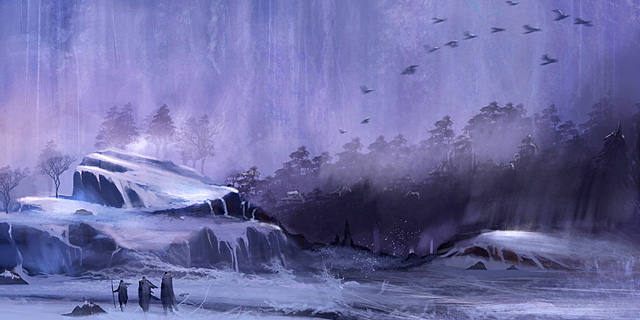A Song of Fire and Ice is a fantasy universe rife with potential in alternate storytelling media, as has been shown with popularity of the TV show based on the series. A Game of Thrones: Genesis, from Cyanide Studios, covers the history of Westeros leading up to the main story. It’s an ideal setting for a strategy game, and the team does a good job of translating the characters and story from novels to cutscenes.
As a real-time strategy game, Genesis changes the standard the formula a bit, as war is not the driving force in winning a game. Instead, earning Prestige Points is what you should focus on. The first House to gain 100 of them wins the round. Prestige is earned by having the highest income, the most allies and the most enemy kills. The longer you are the leader in any of those categories, the more Prestige you’ll earn. There is a peace-war meter that starts out at fully peaceful and moves toward war with each hostile act by anyone in the game. Open hostilities and direct attacks against an enemy are not possible until war is declared, and whoever declares war loses Prestige Points equal to the amount of peace left in the meter.
There are two resources that you’ll need to keep an eye on: gold and food. Gold is used to hire all of the noncombat, secret, and mercenary units you’ll need in your quest to conquer Westeros. Food is used to feed the various armies you’ll hire to openly take on your rivals. Food is gathered by working the fields of your allied towns with peasants, while gold is automatically collected simply by being allies with towns: the more towns, the more income.
There are even multiple ways of gaining allies, by either openly approaching a town with an envoy, or secretly approaching a town allied with a rival with a spy and making a secret agreement. This will covertly break their alliance and divert some income to you while your opponent is clueless that it has happened. You can prevent this from happening by hiring a noble lady and marrying her off in an allied town. Unless she is assassinated, she creates a permanent blood alliance with that town.
Combat is based off a rock-paper-scissors system and armies who take heavy casualties can and will retreat from the field of battle if they don’t have a commander to rally them.
The graphics are average for a strategy game, which means it doesn’t really matter. It looks perfectly fine when zoomed out, which is the view you’ll want most of the time anyway. The sound effects are fitting and work well, and the voice acting is serviceable.
There are a few problems with this game, though the main issue with the single player is the fact that everything feels a little rough around the edges. A few more months of polish would have gone a long way. Unfortunately, despite the presence of two different multiplayer modes, I was unable to find anyone to play against in multiple attempts. This may change as time goes on and more people pick it up during Steam sales, but the lack of a viable multiplayer component is, for now, simply unable to be overlooked.
If you’re a fan of A Song of Fire and Ice, you’ll find plenty to like here. Similarly, if you like strategy games, this is a nice take on the RTS. Just don’t go into it expecting it to have much replay value unless the multiplayer community picks up.
Pros: Different take on the standard RTS, great narrative backdrop
Cons: Needs more polish, dead (for now?) multiplayer component




















